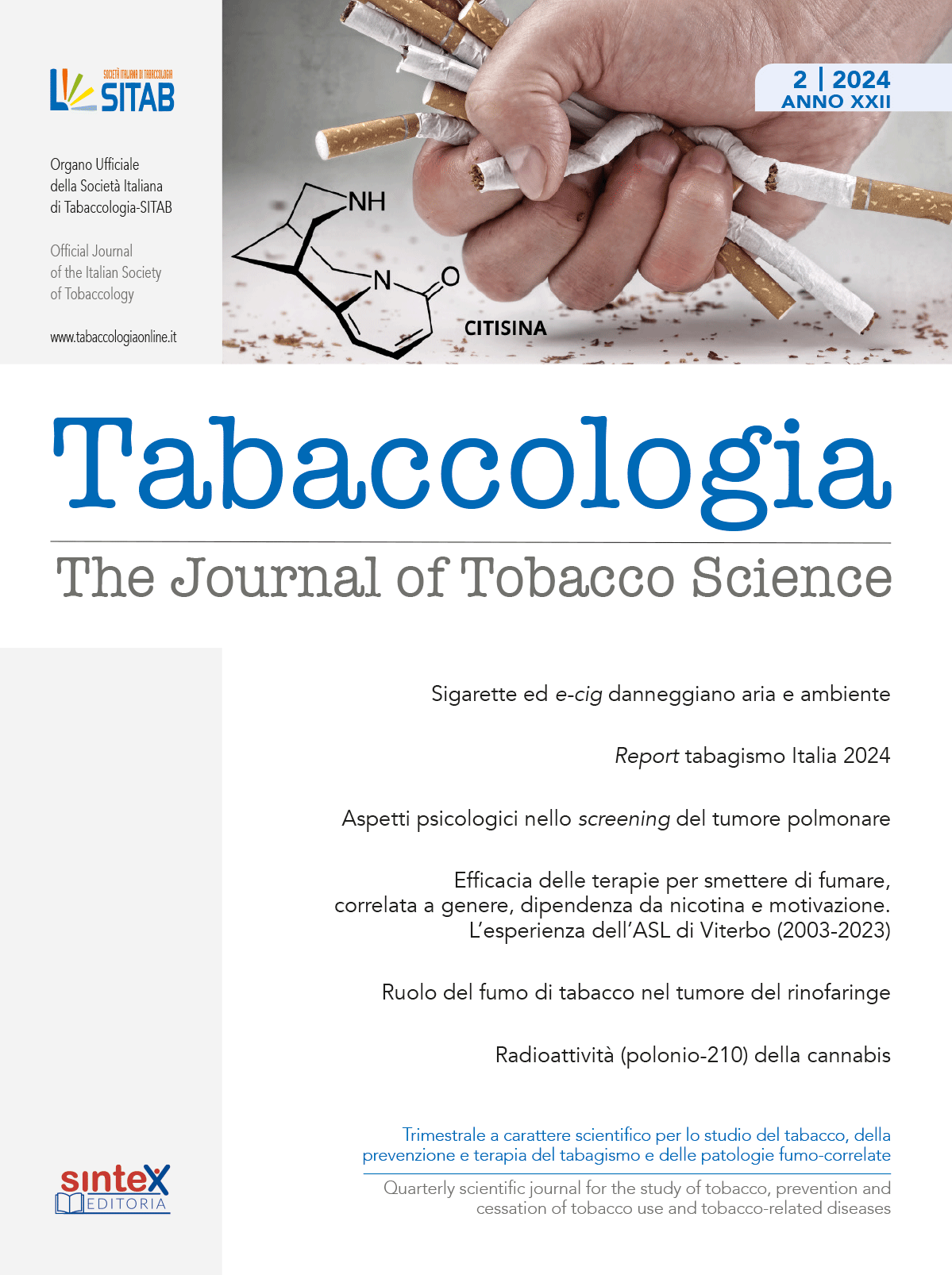|
Rassegna Stampa Scientifica Ottobre 2023
|
“Plans to phase out the sale of cigarettes in England will be the "biggest public health intervention in a generation", Rishi Sunak has said. The PM told the BBC there was "no safe level of smoking" when asked about restricting people's right to choose. His plan seeks to raise the legal age of smoking every year by a year so that eventually no-one can buy tobacco. Tory MPs will be allowed a free vote while Labour indicated it would back the policy… Mr Sunak told the BBC smoking cigarettes was not the same as eating crisps or a piece of cake because it could not be part of a balanced diet and there was no safe level of smoking. "Smoking is unequivocally the single biggest preventable cause of death, disability and illness in our society," he said. "Everyone recognises this measure will be the single biggest intervention in public health in a generation."…
“The proposal to raise the age of sale of cigarettes is similar to laws being introduced in New Zealand, where buying tobacco products will remain banned for anyone born after 2008.” [James Gregory. Rishi Sunak defends his plan to ban smoking for younger generation, BBC News. See also: Rishi Sunak considers banning cigarettes for next generation, The Guardian; Health charities welcome Sunak’s plan to curb smoking in England, The Guardian; Almost £1bn wiped off tobacco firms after Sunak’s smoking crackdown, Yahoo! News; Boris Johnson’s former food tsar attacks Sunak’s smoking ban: ‘Odd to prioritise cigarettes over fast food’, The Independent]
“Once upon a time, a crafty fag behind the bike sheds was the mark of a teenage rebel. But not any more, which is why the vast majority of British 15-year-olds will be singularly unbothered about becoming the last generation legally allowed to buy cigarettes. A princely 3% of them smoke, a habit now widely regarded as for old people. One in five girls that age, however, use candy-coloured, sweet-flavoured vapes. They’re cheaper, just as easily bought underage, and don’t make your hair smell horrible. So why persevere with raspy throats and ash on the carpet when they can get a nicotine fix that tastes of bubblegum or banana, from a device dinky enough to hide in a school blazer pocket?...
“There’s something both rebellious and oddly innocent-looking about vaping, a perennially appealing combination to teenage girls. They know smoking kills, but puffing on a strawberry e-cigarette seems barely more dangerous than sucking the end of your Hello Kitty pen in primary school, despite the worrying questions hanging over vaping’s unknown long-term effects and over high levels of toxic heavy metals in some cheap devices… Were we to find out decades hence that vaping is worse for you than suspected, by then we’d have a population already too hooked to give it up easily. And if that sounds familiar, it’s roughly what happened with cigarettes….
“Forcing manufacturers to market vapes as the boring, clinical tool for helping adult smokers that they’re actually supposed to be – no sexier than a blister pack of nicotine gum and definitely not mango ice blast-flavoured – seems thoroughly sensible. Combining that with ramping up enforcement and safety checks to disrupt the black market in illegal e-cigarettes, to protect the health of those already hooked, could well make a difference… The longer governments drag their feet, the more kids will take up vaping, sucking chemicals into developing lungs with potential longterm consequences we have yet to understand – and one with which we’re already very familiar: that of being suckered into an expensive lifelong nicotine dependency that may keep them hooked long after they want to be.” [Gaby Hinsliff. Sunak is right to phase out cigarettes – but without tackling vapes his public health strategy will go up in smoke, The Guardian]
“By introducing a tobacco levy, we could make the industry pay for the damage it does to people’s lives, to our economy and to the NHS [National Health Service]. Collecting this money could come from price-capping and profit controlling or from tax increases – either way it is imperative that the tobacco industry should have no say over how this money was spent. The government wants England to be smoke-free by 2030. This is a noble and necessary target, but one it is set to miss by almost a decade. A tobacco levy could help to turn this around. No matter what your political views are, one way or another, tobacco affects us all. The loss of loved ones to smoking-related disease, NHS backlog and waiting lists, economic inactivity due to ill health: none of these are party-political issues, which is why cross-party collaboration and commitment is vital.” [Michelle Mitchell, chief executive, Cancer Research UK. What to do about the tobacco companies still killing millions? Make them pay – and heavily, The Guardian]
"[Ohio Republican Governor Mike] DeWine has a “nanny state” mentality, said Ohio state Rep. Bill Seitz, the state House majority floor leader and fellow Republican who has helped block tobacco tax increases amid aggressive lobbying by industry interests. The 68-year-old Seitz, who smoked for 50 years before developing kidney cancer and having a kidney removed this summer, said he’s unmoved by his own brush with the health system — even if it led him to finally kick the habit. “I’m not going to turn into a smoke Nazi just because I used to smoke and I don’t anymore,” Seitz said... Ohio’s GOP [Grand Old Party, i.e. Republican] lawmakers have also rebuffed multiple efforts to boost cigarette taxes, a public health measure proven to decrease smoking rates — especially among new and young smokers.
“When Gov. John Kasich (R) attempted to raise the cigarette tax by $0.65 per pack in 2017, business lobbyists warned that residents would spend their money elsewhere, with one testifying that “consumers are coming into Ohio to save money on their cigarettes from Pennsylvania.” The tax increase was defeated... Not surprisingly, experts said, Ohio’s smoking rate exceeds that of nearby states with stricter tobacco measures. Almost 21 percent of adults in Ohio smoked in 2019, compared with 17 percent of Pennsylvanians and nearly 13 percent of New Yorkers... There’s also a notable difference in health outcomes: Smoking-related deaths — including from lung cancer, heart disease and chronic lower-respiratory disease — have declined sharply across the country over the last two decades but increased in Ashtabula [Ohio], where middle-aged adults are 55 percent more likely to die of those causes than the national average...
“As nearby states have shown more progress in curbing smoking, Ohio lawmakers have struggled to prioritize tobacco control, a decision telegraphed by how the state has spent billions of dollars from a landmark national settlement with cigarette companies in 1998. That windfall initially led to the creation of a tobacco prevention foundation, ad campaigns to warn against smoking and other initiatives helping users to quit. By 2005, Ohio was spending nearly $55 million that year on tobacco prevention and related activities — close to the CDC’s recommended annual levels... But even as state smoking rates fell, advocates repeatedly warned that lawmakers were raiding the tobacco fund to pay for other priorities... Lawmakers’ decision to shift funding away from public health and toward other investments was “devastating,” said Amy Rohling McGee, president of the Health Policy Institute of Ohio, adding that the loss of the tobacco prevention foundation made it harder to coordinate a statewide strategy. “Those dollars provided an infrastructure we no longer have.”...
“Meanwhile, Ohio’s adult smoking rate rebounded, rising from 20 percent in 2008 to 25 percent in 2011, according to the CDC. The state now has one of the highest smoking rates in the country... Ohio’s tobacco tax has been raised just once since 2005. Public health experts say the state’s relatively low tobacco tax is a key reason it had the fourth-highest adult smoking rate in the country — and ranked near the bottom of states for life expectancy as of 2019. In contrast, Pennsylvania’s middle-of-the-pack smoking rate matched its life expectancy ranking, and New York — whose cigarette tax is now more than three times that of Ohio’s — had one of the lowest smoking rates and ranked third in life expectancy.
“Rob Crane, a family medicine physician and antismoking advocate, said losses in the Ohio legislature despite clear evidence regarding the harmful health effects of smoking left him “scratching my head” — until he learned that more than two dozen lobbyists had worked to defeat efforts to raise the legal age to buy cigarettes in the late 1990s. “It was just an eye-opener to the level of participation by the tobacco industry in the state legislature,” said Crane, who founded a national group that successfully fought to raise the minimum age for tobacco and nicotine sales in the United States to 21 in 2019. The might of the tobacco lobby was also crucial to defeating [Republican Governor John] Kasich’s push for a higher cigarette tax in the 2010s, said Greg Moody, who coordinated that effort. Several Democrats described how their party’s own attempts to raise tobacco taxes stalled out in the GOP-dominated legislature." [Lauren Weber, Dan Diamond, Dan Keating. HOW RED-STATE POLITICS ARE SHAVING YEARS OFF AMERICAN LIVES, Washington Post]
Ed. Note: Although some of the issues are specific to the US, much of this extensive report highlights universal concerns and issues at the intersection of politics and public health. Other health issues are discussed as well but, as can be gleaned from the lengthy excepts above, the biggest focus is on the costs and impact of smoking on individuals’ and public health. If paywalled, you should be able to access the full dossier here. ‘Red-State’ in the headline refers to the colour red associated with the Republican Party, in contrast to blue for the Democrats.
“Calls have been made to ban the sale of vapes and tobacco products in the vicinity of schools in a bid to “protect young people”. The step could work towards “educating a nicotine and tobacco-free generation”, according to The World Health Organisation (WHO). WHO said the “tobacco industry relentlessly targets young people”, with products such as single-use vapes made more affordable. A new guide by the organisation aims to support schools and teachers in making campuses smoke and nicotine-free via a series of policies.” [Storm Newton. Call to ban the sale of vapes and cigarettes near schools, Yahoo! News. See also: Ban smoking and vaping in school to protect young people, WHO]
“Rishi Sunak is considering introducing some of the world’s toughest anti-smoking measures that would in effect ban the next generation from ever being able to buy cigarettes, the Guardian has learned. Whitehall sources said the prime minister was looking at measures similar to those brought in by New Zealand last December. They involved steadily increasing the legal smoking age so tobacco would end up never being sold to anyone born on or after 1 January 2009.” [Pippa Crerar, Rowena Mason. Rishi Sunak considers banning cigarettes for next generation, The Guardian. See also: Sunak considering total ban on cigarettes for future generations, The Telegraph]
“The message that vaping is 95% safer than smoking has backfired, encouraging some children to vape, says a top health expert. Dr Mike McKean treats children with lung conditions and is vice-president for policy at the Royal College of Paediatrics and Child Health. He says the 2015 public messaging should have been clearer - vapes are only for adults addicted to cigarettes. Evidence on the possible health risks of vaping is still being gathered. In an exclusive interview with the BBC, Dr McKean said… the 95% safe messaging was "a very unwise thing to have done and it's opened the door to significant chaos"… "It feels like we have put all our eggs in one basket and said 'this is the way to tackle cigarette smoking' and I feel we have neglected children and young people, by sort of embracing something almost too much without the real proper thought."” [Hugh Pym, Lucy Watkinson. Vapes '95% safer' than cigarettes messaging backfired, BBC News]
Ed. Note: The 2015 messaging should not merely have been “clearer”, it should not have been based on an outright lie. There is absolutely no scientific study ever that has established e-cigarettes as 95% safer or anything close to it. The harm done in terms of youth uptake, environmental damage, the renewed seat at the table fo the tobacco industry and the divisions caused in our tobacco control community can never be matched by any putative, arguable cessation benefits. This excellent blog from the Swiss Association for Tobacco Control makes the case impeccably: “The “95% myth” is a factoid, that is, unreliable information repeated so often that it is accepted as fact.” [Luciano Ruggia. E-cigarettes 95% less dangerous? Myth, scientific lies, and manipulations, Swiss Association for Tobacco Control]
“Women who smoke during pregnancy are 2.6 times more likely to give birth prematurely compared with non-smokers – more than double the previous estimate, research suggests. The University of Cambridge study found smoking meant the baby was four times more likely to be small for its gestational age, putting it at risk of potentially serious complications including breathing difficulties and infections.” [Amy Lewis. Premature birth risk from smoking while pregnant higher than previously thought, ITV]
"Based on objective data, consistent exposure to smoking throughout pregnancy was strongly associated with sPTB [spontaneous pre-term birth] and FGR [fetal growth restriction]. High levels of paraxanthine were not independently associated with any of the studied outcomes and were confounded by smoking."
Objective measures of smoking and caffeine intake and the risk of adverse pregnancy outcomes
International Journal of Epidemiology, dyad123.
Published:28 September 2023
Roshan J Selvaratnam, Ulla Sovio, Emma Cook, Francesca Gaccioli, D Stephen Charnock-Jones, Gordon C S Smith
https://academic.oup.com/ije/advance-article-abstract/doi/10.1093/ije/dyad123/7283200
“Complementing cessation-focused trials, results suggest that unguided e-cigarette use also leads to smoking cessation, allaying the notion that causal effects of e-cigarettes on cessation are not reflective of real-world scenario of self-determined use. For smokers who may not be able to quit using existing pharmacologic approaches, e-cigarettes may be considered to achive (sic) that purpose.”
Effect of unguided e-cigarette provision on uptake, use, and smoking cessation among adults who smoke in the USA: a naturalistic, randomised, controlled clinical trial
eClinicalMedicine 2023; 63: 102142. SEPTEMBER 2023
Published: August 15, 2023
Matthew J. Carpenter, Amy E. Wahlquist, Jennifer Dahne, Kevin M. Gray, K. Michael Cummings, Graham Warren, Theodore L. Wagener, Maciej L. Goniewicz, Tracy T. Smith
https://www.thelancet.com/journals/eclinm/article/PIIS2589-5370(23)00319-X/fulltext
https://www.thelancet.com/action/showPdf?pii=S2589-5370%2823%2900319-X
Note: Open Access.
“We detected some indications that alternative nicotine products are competing with cigarettes rather than promoting smoking and that regulations that allow their sales are associated with a reduction rather than an increase of smoking, but the findings are inconclusive because of insufficient data points and issues with the assumptions of the pre-specified statistical analyses.”
Effects of reduced-risk nicotine-delivery products on smoking prevalence and cigarette sales: an observational study
Public Health Research Volume: 11, Issue: 7, Published in September 2023
Francesca Pesola, Anna Phillips-Waller, Emma Beard, Lion Shahab, David Sweanor, Martin Jarvis & Peter Hajek.
https://www.journalslibrary.nihr.ac.uk/phr/RPDN7327/#/abstract
Note: Open Access.





















